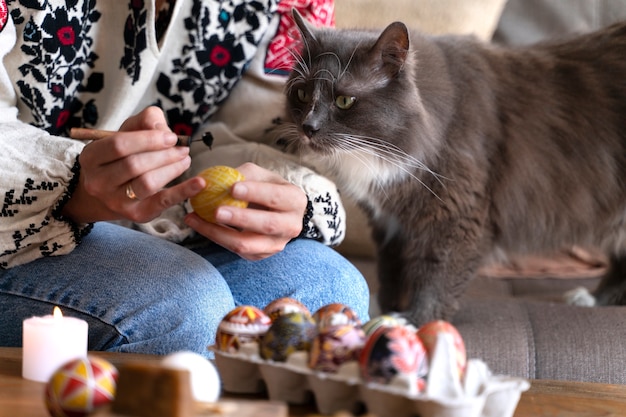As a seasoned cat owner, I've always been a bit cautious about feeding my furry companions human food. After all, we all know that chocolate is a big no-no for cats. But what about eggs? I've always heard that they're a good source of protein, but I also know that raw eggs can be a bit risky. So, I decided to delve into the world of feline egg consumption and find out what the deal is. Spoiler alert: it’s a bit of a mixed bag!
(Part 1) Are Eggs a Good Treat for Cats?

You bet! Eggs are a great source of protein, vitamins, and minerals, all of which are essential for a healthy cat. And let’s face it, they’re a delicious treat that most cats adore. Who can resist a perfectly cooked, runny yolk?
The Benefits of Eggs for Cats
Let's break down the nutritional goodness hidden within those eggshells.
- Protein: Eggs are packed with high-quality protein, which is crucial for building and maintaining muscle mass. It's also essential for healthy growth and development, especially for kittens. Cats are obligate carnivores, meaning they need a high protein diet to thrive. Eggs provide a readily digestible form of protein that can help support their overall health and well-being.
- Vitamins: Eggs are a treasure trove of vitamins, including vitamin A, which supports vision and immune function. They also boast vitamin B12, crucial for healthy nerve function and energy production. And let's not forget riboflavin, which is essential for healthy skin and coat. This is especially important for cats, as their skin and coat can be indicators of overall health.
- Minerals: Eggs are also rich in minerals like selenium, which acts as an antioxidant and supports thyroid function. They also contain iron, which helps carry oxygen throughout the body. These minerals contribute to various bodily functions, ensuring your cat stays healthy and energetic.
So, it's clear that eggs can be a beneficial addition to your cat's diet. However, like with any treat, moderation is key!
(Part 2) The Risks of Raw Eggs

Now, here's where things get a little tricky. While cooked eggs are a delightful treat, raw eggs can pose some risks to your feline friend.
1. Salmonella Contamination
Raw eggs can carry a nasty bacteria called Salmonella. This little bug can cause food poisoning in cats, leading to vomiting, diarrhoea, and even fever. Symptoms of salmonella poisoning in cats can be quite severe and may require veterinary attention. The risk of salmonella contamination is particularly high in eggs that have not been properly refrigerated or have been left at room temperature for too long.
2. Avidin
Raw eggs contain a protein called avidin, which can interfere with the absorption of biotin (vitamin B7). This vitamin is crucial for healthy skin, hair, and nails. So, feeding your cat raw eggs regularly could lead to skin problems, hair loss, and nail issues. While cooked eggs also contain avidin, the cooking process destroys it, making cooked eggs safe for consumption.
(Part 3) cooking eggs for Your Cat

Now that we've established the dangers of raw eggs, let’s talk about safe and delicious ways to prepare them for your furry friend.
1. Hard-boiled eggs
hard-boiled eggs are a classic and safe option for cats. Just boil them until the yolk is completely set. Then, peel them and give your cat a few slices. Remember to remove any shell fragments. My cat, Whiskers, absolutely loves them, especially with a little bit of chopped parsley sprinkled on top! Parsley is a safe herb for cats and adds a bit of flavor to their egg treat.
2. scrambled eggs
Scrambled eggs are another excellent choice for cats, especially if they prefer their eggs a little less firm. Simply whisk a few eggs and cook them over low heat until they're just set. You can add a dash of water or milk to make them extra fluffy. Avoid using butter or oil, as it can cause digestive upset for some cats. Plain, unseasoned scrambled eggs are the best option for your feline friend.
3. Omelettes
If you're feeling adventurous, you can even try making a simple egg omelette for your cat. Just whisk a couple of eggs, add a pinch of salt and pepper, and cook them in a nonstick pan. Don't add any cheese, onion, or other ingredients that are toxic to cats. Remember, a plain omelette is best, without any additional ingredients that could potentially harm your cat.
4. Tips for Safe Egg Preparation
Here are a few additional tips to ensure you're preparing eggs safely for your cat:
- Use fresh eggs. Fresh eggs are less likely to be contaminated with bacteria.
- Cook eggs thoroughly until the yolk is firm. This ensures that any potential bacteria are destroyed.
- Avoid using any ingredients that are toxic to cats, like garlic, onion, or chives. Garlic, onion, and chives belong to the allium family and are toxic to cats. They can cause gastrointestinal upset, anemia, and even damage to red blood cells.
- Remove any shell fragments before feeding them to your cat. Shell fragments can be a choking hazard and may also cause digestive issues.
Remember, cooked eggs should be offered in moderation as a treat, not as a staple food. A balanced diet is essential for your cat's overall health.
(Part 4) Serving Size and Frequency
Just like with humans, moderation is key when it comes to treating your cat with eggs.
The Right Amount
For a small cat, a single egg, chopped or sliced, is usually enough. For larger cats, you can offer up to half an egg a day. I always start with a small amount and see how Whiskers reacts. You can always offer more if your cat seems hungry. Start small and observe your cat's response to avoid any digestive issues.
Frequency
I've learned that it's best to offer eggs to your cat as an occasional treat. It’s perfectly fine to give them a cooked egg once or twice a week, but no more than that. It's important to maintain a balanced diet and avoid overfeeding. A varied diet is crucial for providing your cat with all the essential nutrients they need.
(Part 5) Signs of Egg Allergy
Like any food, some cats may be allergic to eggs. If you notice any of these symptoms, discontinue giving eggs to your cat and consult your vet:
- Vomiting
- Diarrhoea
- Skin rash
- Itching
- Sneezing
- Wheezing
If your cat experiences any of these symptoms, it's important to stop giving them eggs and consult with your vet. They can help you determine if it’s an allergy and recommend a suitable alternative.
(Part 6) Egg Alternatives
If your cat has an allergy or you’re just looking for alternative protein sources, here are some options:
- Chicken: Cooked chicken, skinless and boneless, is a great source of protein for cats. You can boil, roast, or bake it for a delicious treat. Chicken is a readily available and easily digestible source of protein for cats.
- Turkey: Similar to chicken, turkey is another lean protein source. You can give your cat cooked turkey breast in moderation. Turkey is a good alternative to chicken, offering similar nutritional benefits.
- Fish: Cooked fish, like salmon or tuna, is another excellent source of protein and omega-3 fatty acids. Be sure to remove any bones before feeding it to your cat. Fish, especially fatty varieties like salmon, is an excellent source of omega-3 fatty acids, which are beneficial for your cat's skin, coat, and overall health.
Remember, any new food should be introduced gradually to avoid digestive upset. Introducing new foods slowly and monitoring your cat's reaction can help prevent digestive issues.
(Part 7) My Personal Experience
I’ve been giving Whiskers cooked eggs for years, and he absolutely loves them. We usually have a hard-boiled egg once or twice a week, and he's never had any digestive issues. He gets so excited when he sees me preparing his egg, it’s the cutest thing! I can’t resist giving him a little extra treat now and then.
I also try to vary his diet, ensuring he gets a mix of protein sources like chicken, turkey, and fish. I find that mixing up his diet keeps him happy and healthy. A varied diet helps prevent boredom and ensures your cat gets all the nutrients they need.
(Part 8) A Word of Caution
While cooked eggs can be a healthy and delicious treat for cats, it’s important to remember that they should be offered in moderation. Overfeeding your cat eggs can lead to digestive problems and weight gain. It’s also crucial to consult your vet about introducing any new foods into your cat’s diet, especially if your cat has any underlying health conditions. Always consult with your veterinarian to ensure that the food you're giving your cat is appropriate for their individual needs.
(Part 9) FAQs
Here are some frequently asked questions about feeding eggs to cats:
Q1. Can cats eat raw egg yolks?
No, cats should not eat raw egg yolks. Raw egg yolks can carry salmonella bacteria, which can cause food poisoning in cats. It’s always best to cook eggs thoroughly before feeding them to your cat.
Q2. Is it okay to feed cats egg whites?
Yes, egg whites are safe for cats to eat in moderation. However, it's important to note that they are lower in nutrients than egg yolks. If you're feeding your cat eggs, it's best to include both the yolk and the white for a more balanced and nutritious treat.
Q3. Can I give my cat eggshells?
No, it's best to avoid giving eggshells to your cat. They can be a choking hazard and may also cause digestive problems. Always remove the shell before giving your cat a cooked egg.
Q4. How do I know if my cat is allergic to eggs?
If you suspect your cat is allergic to eggs, watch for signs like vomiting, diarrhoea, skin rash, itching, sneezing, or wheezing. If you notice any of these symptoms, discontinue giving eggs to your cat and consult your vet. They can help you determine if it’s an allergy and recommend a suitable alternative. It's essential to observe your cat for any adverse reactions to new foods and consult with your vet for any concerns.
Q5. Can I feed my pregnant cat eggs?
While cooked eggs can be a nutritious treat for pregnant cats, it's important to consult with your vet. They can advise on the appropriate serving size and frequency. It's also a good idea to introduce any new food gradually and monitor your cat for any adverse reactions. Pregnant cats have special dietary needs, and your vet can provide guidance to ensure a healthy pregnancy for both mom and kittens.
(Part 10) Final Thoughts
So, can cats eat cooked eggs? The answer is a resounding yes, with a little caution. Cooked eggs can be a healthy and delicious treat for your feline friend, but it's important to feed them in moderation and always consult with your vet. As for Whiskers, he’s still enjoying his occasional egg treat, and I’ll continue to enjoy watching him devour them!
Everyone is watching

How to Cook Frozen Lobster Tails Perfectly: A Step-by-Step Guide
RecipesLobster. Just the word conjures up images of lavish meals, special occasions, and a taste of luxury. But let's...

Pigs in a Blanket Cooking Time: How Long to Bake for Perfect Results
RecipesAh, pigs in a blanket. Just the name conjures up images of those delightful little parcels of crispy pastry en...

Pork Fillet Cooking Time: How Long to Cook It Perfectly
RecipesPork fillet, or tenderloin as it's sometimes called, is a real favourite in our house. It's so versatile, and...

The Ultimate Guide to Tender, Juicy Pulled Pork
RecipesRight, let's talk pulled pork. It's one of those dishes that just screams "comfort food," doesn't it? I mean...

The Ultimate Guide to Cooking Sweet Potatoes: From Roasting to Mashing
RecipesSweet potatoes. Just the name conjures up images of warm, comforting dishes, bursts of vibrant color, and a to...
